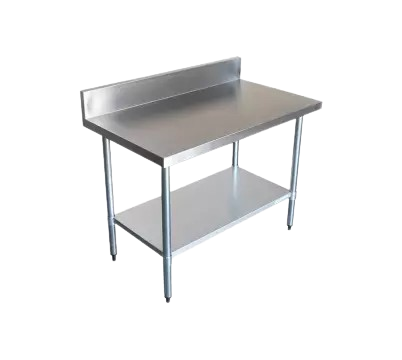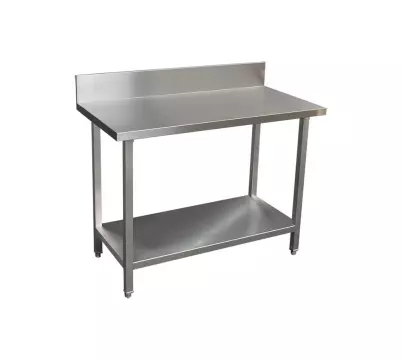
The Hygienic Benefits of Stainless Steel Benches in Food Service Establishments

Introduction
In the fast-paced world of food service establishments, maintaining high levels of hygiene is crucial. One important aspect of ensuring cleanliness and safety is the use of stainless steel benches. These versatile and durable pieces of equipment offer numerous advantages that contribute to a hygienic environment in commercial kitchens. From their applications to maintenance tips, this article will explore the importance of stainless steel benches in food service establishments.
Importance of Stainless Steel Benches in Commercial Kitchens
Stainless steel benches play a vital role in maintaining cleanliness and hygiene in commercial kitchens. Here are some key reasons why they are highly valued:
1. Durability and Longevity
Stainless steel benches are known for their durability, making them perfect for heavy-duty use in commercial kitchens. They can withstand constant wear and tear, resisting dents, scratches, and stains. This longevity ensures that the surfaces remain intact and free from any potential harborage points for bacteria or other contaminants.
2. Corrosion Resistance
One of the most significant advantages of stainless steel benches is their resistance to corrosion. The material's composition prevents rust formation, even when exposed to moisture or acidic substances commonly found in food preparation areas. This resistance ensures that the benches maintain their hygienic properties over an extended period.
3. Non-Porous Surface
Stainless steel has a non-porous surface, meaning it does not have any small openings or cracks where bacteria or dirt can accumulate. This characteristic makes it easy to clean and disinfect stainless steel benches thoroughly, minimizing the risk of cross-contamination.
4. Heat Resistance
Commercial kitchens involve various cooking processes that generate high temperatures. Stainless steel benches can withstand extreme heat without warping or melting, ensuring their structural integrity remains intact. This resistance to heat is essential for maintaining hygiene as it prevents any damage that could compromise cleanliness.
5. Hygienic Material
Stainless steel is inherently hygienic, making it an ideal choice for food service establishments. Its smooth surface is easy to clean and sanitize, reducing the risk of bacterial growth and contamination. Additionally, stainless steel is non-reactive to food substances, ensuring that no harmful molecules leach into the food during preparation or storage.
Advantages of Stainless Steel Benches
The benefits of using stainless steel benches in food service establishments extend beyond hygiene. Let's explore some additional advantages:
1. Versatility
Stainless steel benches come in various sizes and configurations to suit different kitchen layouts and requirements. They can be customized with additional features such as sinks, shelves, or drawers, providing ample workspace and storage options. This versatility allows for efficient workflow and organization in busy commercial kitchens.
2. Aesthetics
Apart from their functional benefits, stainless steel benches also contribute to the overall aesthetics of a commercial kitchen. The sleek and modern appearance adds a professional touch, creating a clean and inviting environment for both staff and customers.
3. Cost-Effective
While stainless steel benches may initially seem like a more significant investment compared to other materials, their long-term cost-effectiveness becomes evident over time. The durability and low maintenance requirements of stainless steel reduce the need for frequent repairs or replacements, ultimately saving money in the long run.
4. Environmental Sustainability
Stainless steel is a highly sustainable material due to its recyclability. It can be repurposed into new products without losing its quality or properties. By choosing stainless steel benches, food service establishments contribute to reducing waste and minimizing their environmental footprint.
Applications of Stainless Steel Benches
Stainless steel benches find extensive applications in various areas within food service establishments:
1. Food Preparation Stations
Stainless steel benches are commonly used as workstations for food preparation activities. Their hygienic surface and durability make them ideal for chopping, slicing, and other food processing tasks. Additionally, the non-reactive nature of stainless steel ensures that the taste and quality of the ingredients remain unaffected.
2. Dishwashing Areas
In commercial kitchens, proper dishwashing is crucial to maintain hygiene standards. Stainless steel benches with integrated sinks provide an efficient and hygienic space for washing dishes, utensils, and other kitchenware. The corrosion resistance of stainless steel ensures that the sink remains in optimal condition even with constant exposure to water and cleaning agents.
3. Storage and Shelving Units
Stainless steel benches can be equipped with shelves or drawers, offering additional storage space for ingredients, utensils, or equipment. These storage units are easy to clean and maintain, ensuring that stored items remain free from contamination.
4. Serving Stations
During food service operations, stainless steel benches serve as convenient serving stations for plating dishes or assembling orders. Their smooth surfaces allow for easy transfer of food items while maintaining cleanliness and minimizing the risk of cross-contamination.
Maintenance Tips for Stainless Steel Benches
Proper maintenance is essential to maximize the hygienic braycostainless.co.nz benefits of stainless steel benches in food service establishments. Here are some useful tips:
1. Regular Cleaning
To ensure cleanliness, stainless steel benches should be cleaned regularly using warm water and a mild detergent. This removes any grease or food residues that may accumulate on the surface. After cleaning, thorough rinsing is necessary to avoid leaving behind any cleaning agents that could affect hygiene.
2. Disinfection
In addition to regular cleaning, periodic disinfection is crucial to eliminate bacteria or other harmful microorganisms on stainless steel surfaces. Using a food-safe disinfectant approved by relevant authorities is recommended for effective sanitation.
3. Avoid Abrasive Cleaners
Abrasive cleaners or scouring pads should be avoided when cleaning stainless steel benches, as they can scratch the surface and compromise its hygienic properties. Instead, use soft cloths or non-abrasive cleaning tools to maintain the integrity of the material.
4. Remove Stains Promptly
Stainless steel benches may occasionally develop stains due to certain food substances or spills. Promptly addressing these stains by using specialized stainless steel cleaners or natural remedies like vinegar and baking soda can help maintain the bench's appearance and hygiene.
5. Regular Inspection
Regularly inspecting stainless steel benches for any signs of damage, such as cracks or loose joints, Brayco New Zealand is essential. Timely repairs or replacements should be carried out to ensure a safe and hygienic environment in food service establishments.
6. Train Staff on Proper Handling
Proper training of kitchen staff regarding the correct handling and maintenance of stainless steel benches is crucial. Educating them on cleaning procedures, disinfection protocols, and the importance of hygiene will help maintain the benches' hygienic benefits effectively.
FAQs about Stainless Steel Benches in Food Service Establishments
Q1: Are stainless steel benches expensive compared to other materials?
A1: While stainless steel benches may have a higher initial cost, their long-term durability and low maintenance requirements make them cost-effective options for food service establishments.
Q2: Can stainless steel benches withstand high temperatures?
A2: Yes, stainless steel benches are heat resistant and can withstand extreme temperatures without warping or melting.
Q3: Do stainless steel benches require any special cleaning products?
A3: Stainless steel benches can be cleaned using warm water and a mild detergent. However, specialized stainless steel cleaners are available for removing tough stains or restoring shine if desired.
Q4: Can stainless steel benches be customized according to specific requirements?
A4: Yes, stainless steel benches can be customized with additional features such as sinks, shelves, or drawers to meet the specific needs of a commercial kitchen.
Q5: Are stainless steel benches environmentally friendly?
A5: Yes, stainless steel is highly sustainable as it can be recycled indefinitely without losing its properties. Choosing stainless steel benches contributes to environmental sustainability.
Q6: How often should stainless steel benches be inspected for damage?
A6: Regular inspections should be conducted to identify any signs of damage on stainless steel benches. Timely repairs or replacements ensure the maintenance of a safe and hygienic environment.
Conclusion
Stainless steel benches offer numerous hygienic benefits in food service establishments. From their durability and corrosion resistance to their non-porous surface and heat resistance, these benches contribute significantly to maintaining cleanliness and safety in commercial kitchens. Their versatility, cost-effectiveness, and aesthetic appeal further enhance their value. By following proper maintenance tips and training staff on their correct usage, food service establishments can fully harness the hygienic benefits of stainless steel benches for a successful and safe operation.